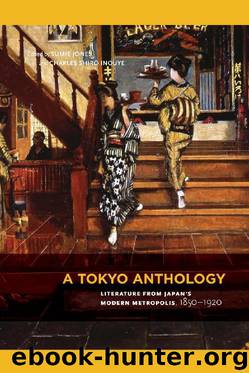A Tokyo Anthology by Unknown

Author:Unknown
Language: eng
Format: epub
Publisher: University of Hawaii Press
Published: 2017-02-27T00:00:00+00:00
To My Fellow Sisters
NAKAJIMA SHŌEN
Poet, essayist, and feminist Nakajima Shōen first received attention as an orator. Then known by her maiden name, Kishida Shun (and later Toshiko), she was a regular on the lecture circuit for the Liberty and Civil Rights Movement. She was nineteen when she made her first speech. “Enchanting, just like the princess in a play,” one admirer said of her. Her hair was arranged high atop her head in an elegant Shimada coiffure, her red crepe kimono set off by a black silk obi. Shōen had lived something of a charmed life. Born to a well-to-do merchant family in Kyoto, she received an above-average education, matriculating into the Kyoto Women’s Normal School in 1877, as a member of its first class. In 1879, having caught the eye of Prince Arisugawa with her wisdom and beauty, she was invited to enter court service, the first commoner so distinguished. Her primary role was to tutor Empress Shōken in the Chinese classics. Unable to abide the sequestered life of the Imperial Court, she tendered her resignation in 1881 and joined the Liberty and Civil Rights Movement, participating enthusiastically and tirelessly in lecture tours—traveling far beyond her home and occasionally into venues typically off-limits to respectable women. Wherever she went, her message was unwavering: women were not only entitled to equality in education and marriage, but also to equal political representation as well.
Shōen was a media sensation. Her lectures, delivered with passion and poise, never failed to rouse her audiences. More than a few future female orators and political agitators cite her as the stimulus that inspired their own activism. Shortly after she began appearing on the lecture circuits, her popularity as an agitator earned her the suspicion of the authorities. On October 12, 1883, she was arrested in Ōtsu for the crime of political speech, jailed for eight days, tried, and fined five yen. Her speech “Daughters in Boxes” (Hakoiri Musume) was less a critique of the political system than it was an indictment of the Japanese family structure that kept women sequestered and denied access to proper education.
Undeterred by her arrest, Shōen continued to lecture until the Liberal Party—and much of the movement she had supported—collapsed in 1884. She then transferred her energies to journalism and teaching. Although her contemporary Fukuda Hideko claimed that Shōen’s attitude changed after she married Nakajima Nobuyuki, one of the founders of the Liberal Party, in 1884, her record of publication shows, if anything, a more determined and focused stance. Without question her most ambitious essay at the time was “To My Fellow Sisters” (Dōhō Shimai ni Tsugu), published in ten installments from May to June 1884 in Light of Freedom (Jiyū no Tomoshibi). The essay reveals her erudition in Japanese and Chinese classics as well as in contemporary Western polemics, such as Herbert Spencer’s chapter “The Rights of Women” in his study Social Statics (1851)—then accessible in a Japanese translation. Before her death from tuberculosis seven years later, she also distinguished herself as a novelist, translator, teacher, and poet.
Download
This site does not store any files on its server. We only index and link to content provided by other sites. Please contact the content providers to delete copyright contents if any and email us, we'll remove relevant links or contents immediately.
Wonder by R.J. Palacio(8577)
Mastering Adobe Animate 2023 - Third Edition by Joseph Labrecque(3840)
Unlabel: Selling You Without Selling Out by Marc Ecko(3661)
Ogilvy on Advertising by David Ogilvy(3616)
Hidden Persuasion: 33 psychological influence techniques in advertising by Marc Andrews & Matthijs van Leeuwen & Rick van Baaren(3562)
Drawing Cutting Edge Anatomy by Christopher Hart(3525)
The Pixar Touch by David A. Price(3435)
POP by Steven Heller(3359)
The Code Book by Simon Singh(3187)
The Art of War Visualized by Jessica Hagy(3006)
Slugfest by Reed Tucker(2999)
The Curated Closet by Anuschka Rees(2969)
Rapid Viz: A New Method for the Rapid Visualization of Ideas by Kurt Hanks & Larry Belliston(2904)
Stacked Decks by The Rotenberg Collection(2882)
365 Days of Wonder by R.J. Palacio(2834)
The Wardrobe Wakeup by Lois Joy Johnson(2781)
Keep Going by Austin Kleon(2759)
Tattoo Art by Doralba Picerno(2664)
Tell Me More by Kelly Corrigan(2651)
